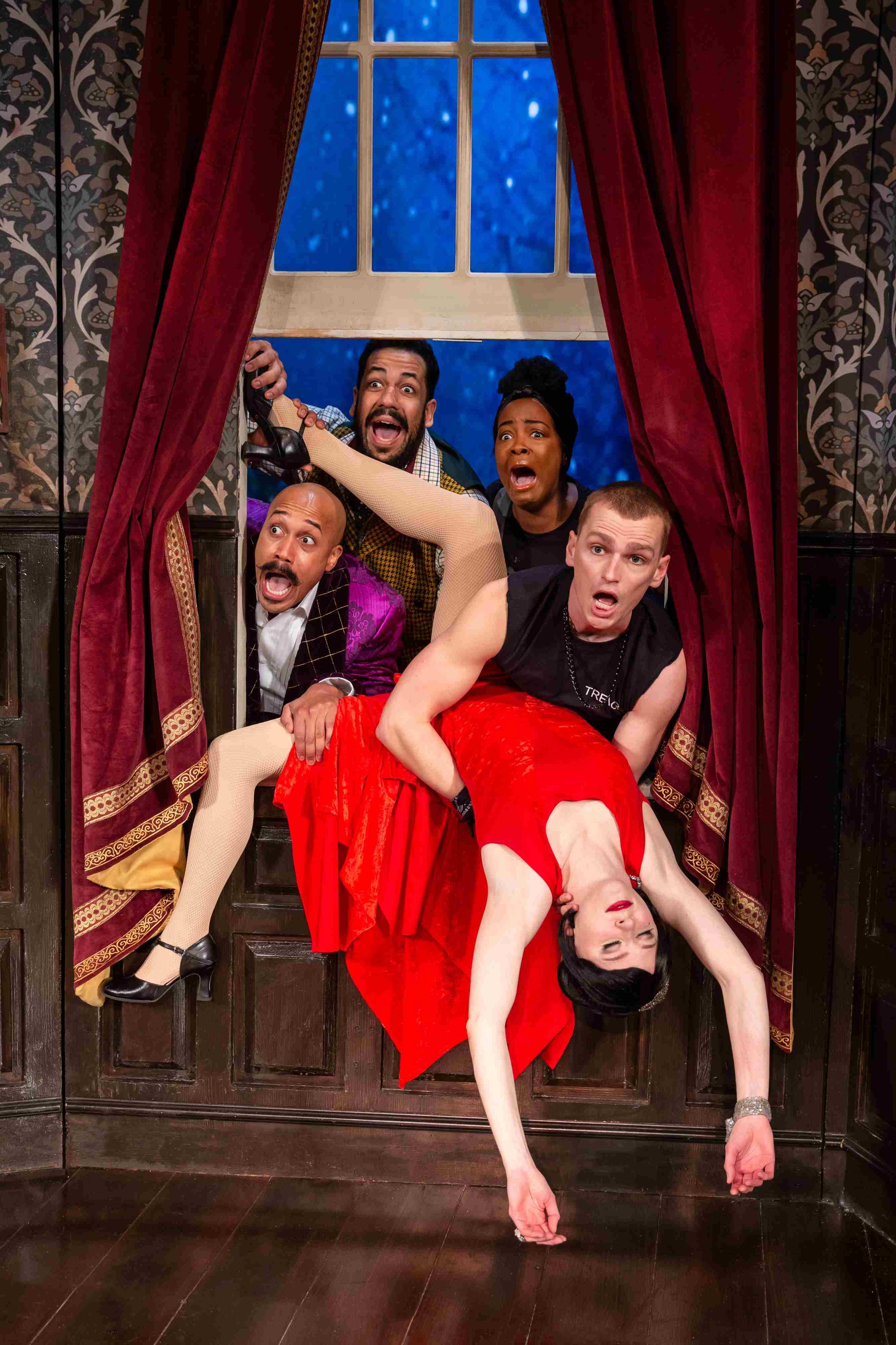CONVERSATIONS Kelly O'Sullivan - The Play That Goes Wrong
Kelly O’Sullivan — Maintaining A Sense of Optimism
The Play That Goes Wrong
Take a look at the cast list for “The Play That Goes Wrong,” opening this week at the Broadway Playhouse, and you will see many familiar names including Matt Mueller, Colton Adams, Jonah D. Winston and Kelly O’Sullivan who are among the Chicago-based company.
You may have seen O’Sullivan at productions on the Goodman and Steppenwolf stages in recent years, however, before and during the shutdown, she had turned attention to writing and performing in film, most recently “St. Francis,” an award-winning production whose truth emanates from her own experiences. It’s all part of a career path that has led the talented actor to broaden her skill set into writing, directing and producing her own work.
O’Sullivan’s first love remains ensemble theater and being cast in “The Play That Goes Wrong” is a dream come true. As we discovered in our conversation, the show includes an unlikely additional “character”: the Tony Award winning set, designed by Nigel Hook, that is so essential to the show the cast rehearsed in New York on the Off-Broadway version.
The show itself is a tightly choreographed farce about an amateur theater troupe’s opening night performance that starts off well enough, but then rapidly disintegrates into chaos, mayhem and uproarious physical comedy. According to O’Sullivan, in order to play it all for laughs requires the cast to maintain a sense of optimism while performing the play within the play. That sounded to me like good advice for our time, to be sure.
There’s much more from Kelly O’Sullivan, who learned at an early age growing up in North Little Rock, Arkansas that theater would play a significant role in her life.
Kelly O’Sullivan: My kindergarten teacher told my mom she thought I would really enjoy doing theater. I was a very energetic playful kid. And so she and my mom took me to audition at a local children's theater called the Arkansas Children's Theater and I loved it. I took to it from the time that I was six years old. I continued doing theater until I was ready to graduate from high school and then went to Northwestern University and majored in theater. There is actually a very thriving group scene in Arkansas and I was very lucky to grow up inside of it.
Ed Tracy: And getting accepted into the theater program at Northwestern is no small accomplishment.
KO: I loved it there and was lucky to have gotten to train with the people that I did there.
ET: When did you attend Northwestern?
KO: Well, I would be revealing my age, so I'll just say it was about a million years ago. Okay?
ET: That's fine. I'll go with that. Were you in the WAMU show?
KO: No, no, no. That's a musical and I am very much a non-musical actor.
ET: So you are an actor. Do you dance?
KO: I do. I was part of a dance group at Northwestern called “Boomshaka” which was hip hop and drumming. So I can dance to a certain level, but not musical level dancing.
ET: I get it. I was an “upper body” dancer growing up. That was the most important half. This show—“The Play That Goes Wrong”—would you call it a farce?
KO: It definitely feels like a farce. There are all of the telltale signs of a farce, lots of people coming in and out of doors and mishaps. From the inside it definitely feels like a farce.
ET: And yet, in this kind of show, I imagine you have to learn it all the right way first in order to make the comedy work.
KO: That's right. For our very first rehearsal, we read a version of the play that goes right so that we would always be able to refer back to it and say: “Okay, if things were not going devastatingly wrong at this moment, how would we be playing this scene?” So even though it is ridiculous, we all have that foundation of truth underneath it. And then everything still starts to fall apart.
ET: The writers are Henry Lewis, Jonathan Sayer and Henry Shields. Have they been involved?
KO: Not in our production, although there is the clear lineage of our director, Matt DeCarlo, who worked very, very closely with them and was the original production stage manager. We feel like we're doing a very faithful production of it.
ET: So tell us, about “The Play That Goes Wrong.” It's a play within a play—“The Murder at Haversham Manor”—and it's presented by the Cornley University Drama Society.
KO: It's opening night of the latest show and they are all very proud of it. They're all very nervous. I would say they are an amateur troupe. When lights come on and the play starts, they are all incredibly optimistic and then slowly but surely some really common mistakes that happen in any theater start to happen. Their mistakes are more extreme than you might find in other theaters.
ET: The set plays a key role in this show.
KO: Yes. It's Nigel Hook’s Tony award-winning set design and when people see the play they will see why. The set acts as a part of the ensemble; it really is a character in the piece. Sometimes the set really helps out the players and sometimes the set sort of sabotages the players. So it's really fun to walk in when you sit in the audience. You just take in how gorgeous this set is. And then over the course of the show, it becomes less gorgeous and more treacherous.
ET: So when you were in New York for a month you did a lot of rehearsing on the set?
KO: The entire time we rehearsed on the set, except for a couple of hours here and there or when the actual show needed to be performed and then we would go to a rehearsal space, but that's the reason they brought all of us out to New York because it's really impossible to rehearse this play in a room without any set pieces. We needed to be on a physical set, rehearsing with all the mechanics of what happens because it is such a crucial part of the plot.
ET: How long were those rehearsals each day? How did they work with respect to the other show?
KO: They were from 9 am to 4:30 pm and then the Off Broadway company would come in and the crew would set up and do the show at night. It was really fun. It felt like a timeshare in a way that we would have it during the day and they would have it at night.
ET: That's a fascinating way to develop the show. I can't think of another show offhand that would have all rehearsals on a set already in production.
KO: Very few shows require that kind of rehearsal with the set, but ours really does.
ET: And then you arrived last week into the Broadway Playhouse and there's your set.
KO: That's right. With tiny little differences. The window may be a couple of inches higher or we have slightly more space in the Off Broadway house, but it was like showing up and seeing an old friend because we had just been with it for a whole month.
ET: And you can make those adjustments rather quickly and then amp the show up to production speed.
KO: Yes. It's not a typical show where we could come in and just do tech on the set. It would have been a total nightmare, so I'm really glad they did it this way.
ET: You play the part of Sandra. Tell us about her role in the show.
KO: Sandra likes things a certain way. She wants to be a star in this ensemble piece. And so she uses every opportunity to take focus and take up space. I think if she had her way she would be the director of the piece, a trait many of the characters actually have in common. And so she's playing the role of Florence Colleymoore in the show who is a real sophisticated lady. She is awesome to play because Florence Colleymoore is the character, but Sandra has such ambition and drive and a sort of greediness underneath her that’s fun.
ET: It's a physical role. How do you balance that acting requirement with the physicality that you need to have?
KO: It's a lot of multitasking. I will say this play is the most multitasking I have ever, ever done as an actor, because you are playing Sandra who plays Florence Colleymoore and you are doing a play within a play, you are having to remember all of this very intense physical choreography that is incredibly technical, and you are trying to be responsive to your fellow ensemble members and the audience. And so it's like trying to keep 25 plates in the air all at once. I think that's the challenge of it and that's the joy of it as an actor—trying to do it all at once.
ET: Is there an element of improv in all of this? Things going wrong even if they are planned to go wrong?
KO: You know the show is so tightly choreographed, we have had certain moments already of there being something spontaneously that goes wrong, that we weren't expecting. For safety reasons, the show is incredibly precise. Something that the audience feels is spontaneous to them takes a lot of skill on the writer, the director and the actor’s part to make it feel that way while all of us should hopefully know exactly what we're doing. So there's less improv than you might think.
ET: Well, the challenge is always not to play the end, right? So, you know the bit is coming and you want to keep it going.
KO: Yes and we talk about it as maintaining a sense of optimism the entire time after the first thing goes wrong and they think everything else is going to go right. And so it's maintaining that sense of optimism rather than giving into the feeling of defeatism.
ET: This is a long sit down here. Seven weeks. It is going to be a great opportunity at the Broadway Playhouse to spread your wings. What does it feel like to be in the middle of this right now?
KO: It feels really exciting. I have worked at the Goodman and Steppenwolf, but the Broadway Playhouse feels different. It is really exciting to be downtown during the holidays and to be working in a new venue.
ET: And it isn't necessarily a holiday show, although it's perfect for the holidays. Perfect for the whole family.
KO: That's right, yes. We say from age eight to 98 there's something for everybody. It is sort of that old world British murder mystery that always makes me think of the holidays. Family fun and a lot of joy.
ET: When I saw the show in New York there was audience interaction. I won't say a lot, but it was certainly important to the play. How is that aspect being handled at this point?
KO: We are still figuring it out. We are about to go into previews and we keep saying in rehearsals that the audience will tell us. And so it's almost like we are waiting now for our other scene partner to show up. And I think that first preview is going to be incredibly informative for some actors more than others. Matt Mueller has a prolonged section where he's talking to the audience. And so I know that we're all very eager to see what that's actually going be like.
ET: You have a lot of interests. You are a writer, a producer and you have done some film acting work. Where does the fire really lie?
KO: Everywhere. The older I get the more I want to play a larger role in the kinds of stories that I'm telling. When you are a young actor you just sort of take the jobs that are given to you. I think the fire for me lies in: Do I believe in the work? Do I believe in the story? and so that takes a lot of different roads for me. I love writing and I love directing and it certainly gives me more agency. I also love being part of the ensemble. There are more and more people who are not sort of sectioning themselves off to just one path anymore. There are more multi-hyphenate people who are acting, writing and directing and doing all of it. And so I want to be really active in doing whatever excites me most at the moment.
ET: You have a new film project underway. Anything you can let us know about that.
KO: The goal is for us to shoot it this summer, it's called “Mouse” and hopefully the next step in my evolution as a filmmaker. I wrote and starred in “St. Francis.” I wrote “Mouse,” and will co-direct. It will be shot in Arkansas which will be really exciting to go back to my home and tell a story from there.
ET: “St. Francis” was somewhat autobiographical, is that true?
KO: There were components of it there that were taken from real life. It is one of those things that you start from your seeds of truth in your own life and then fictionalize from there. So components of it.
ET: So is “Mouse” in the same vein?
KO: Not as much, it's more using real with settings that I know from Arkansas. It's definitely more fictionalized than “St. Francis”.
ET: Well, I have to admit, I don't talk to a lot of actors who have such a broad understanding of the film and television aspect of their lives and are making their art themselves. That does seem to be a trend that you are in the forefront. It is important that actors across the board have multiple projects working all at the same time. I hear it from a lot of very successful actors that they have a kit bag of all of these projects and pivot when necessary.
KO: That's right. I think it is a way to stay engaged. A way to not get rusty or to feel bored. And you want to exercise different muscles because after awhile, at least for me being an actor, people want to pigeonhole you, or they think: “Well, they've done this before, so let's just have them do it again.” It's really up to the individual to say: “Well, I'm tired of that. And I want to do something else. Something that I have more say in.”
ET: We are about four days away from the opening of “The Play That Goes Wrong”. Any final thoughts about coming back home to Chicago?
KO: As we were rehearsing in New York, we kept saying that we can't wait to get home and show this to our friends and families and have people who come visit Chicago see it. It's such a blast. It's so wild. It's so funny and we are excited to bring it to our hometown.
ET: I really hope—and this comes from my heart, Kelly—that everything goes wrong. I hope it goes wrong every single night.
KO: I think it will.
Comments have been lightly edited for length and clarity.
PHOTO: Jeremy Daniel
BROADWAY IN CHICAGO
presents
THE PLAY THAT GOES WRONG
The Broadway Playhouse
Water Tower Place
December 14, 2021 through January 30, 2022
Reviews at PicksInSix®
For more reviews, visit: Theatre In Chicago
PicksInSix® is a registered trademark of Roxbury Road Creative, LLC
PODCASTS available on Apple Podcasts, Audacy and Libsyn
ARCHIVE PICKSINSIX REVIEWS DE USURIS BLOG EMAIL WEBSITE SUBSCRIBE









